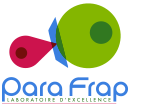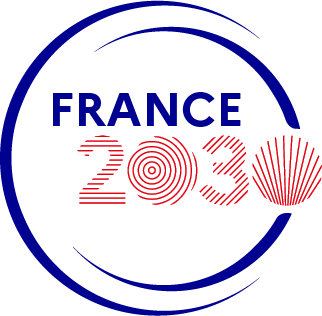

Research in parasitology is multidisciplinary. In addition to molecular biology, cellular biology and biochemistry, it includes, at least in the major human diseases, a strong component of immunology in addition to field epidemiology, clinical research and human and vector genetics. New scientific opportunities are provided by the recently available genome information for most major parasites and their hosts. Combining the state-of-the-art of fundamental research and translational applications, we expect to defeat major parasitic diseases such as malaria, toxoplasmosis, leishmaniasis, African trypanosomiasis, amoebiasis and theileriosis. Although many of the listed diseases occur in the developing world, there are new emergences of these parasitic infections world wide.
The major focus of ParaFrap is the collaboration and further integration of laboratories from disease endemic countries (Africa, India and Latin America) to the consortium. Collaborations with research groups from endemic countries underline the opportunity to validate ‘bench’ work in the field using clinical isolates and perform integrated studies on the disease in its natural environment. On the other hand, particular virulence factors observed in patients or animals infected with field isolates have been explored at the molecular level in high tech laboratories in France. Collaborations with laboratories located in disease endemic countries will be further strengthened by ParaFrap. For example, students from these countries are invited to apply to the PhD program, post doc positions and workshops. The planned biennial meeting will be publicized widely in these countries. Emphasis on the already existing interactions with developing countries, in particular Africa, India, Latin America and China will be one of our major goals. At present, the key strength of the French Parasitology research relies on parasitic diseases caused by protozoan pathogens. For this reason, ParaFrap initially will focus on malaria and toxoplasmosis and other neglected diseases of increasing public health concern including trypanosomiosis, leishmaniasis, bovine tropical theileriosis and amoebiasis. ParaFrap will be open to integrate excellent laboratories working on other parasitic pathogens in the future.
Another goal of ParaFrap is to bring together leading French researchers and establish stable inter-institutional and structural scientific links via a joint scientific and training programs and shared infrastructures. The integration of expertise from academic, industry and laboratories in disease endemic countries should enhance existing studies in basic parasitology research and accelerate translational aspects (diagnosis and intervention strategies) for many major parasitic pathogens.
Taken together, ParaFrap aims to strengthen significantly France’s position as an international leader in this domain. In order to keep ParaFrap open to the French Parasitology community, collaborative research projects and PhD student sandwich fellowships can integrate participants outside the initial core group of the consortium. This will keep the network open and will allow the continual integration of excellent and complementary groups. Another integrating activity is going to be the biennial meeting that will be open to the entire French Parasitology community. This meeting will allow students and post doc to present their data as talks/posters in the presence of PIs and the external Scientific Advisory Board.
Gordon Research Conference 2026 – Biology of Host–Parasite Interactions The 2026 Gordon Research Conference (GRC) on Biology of Host–Parasite Interactions will take place June 7–12, 2026, at Salve Regina University, in...
The INSERM workshop “Modern methods in molecular parasitology” will take place in Montpellier, France, from 4–6 November 2026. This event will bring together leading experts in...
The 15th CAPF (French Anti-Parasitic and Anti-Fungal Consortium) workshop will take place on 16–17 March 2026 in Strasbourg (France). This event is an excellent opportunity for students and postdoctoral researchers to participate and contribute...
Call for Applications: New Junior Research Groups at Institut Pasteur The Institut Pasteur has launched an international call to recruit new junior group leaders.This is a unique opportunity for high-potential scientists to...
JOB : Ingénieur·e d’étude / Research Engineer – Mosquito Immunity (IBMC, Strasbourg) 🇫🇷 Le laboratoire Mosquito Immune Responses recrute un·e ingénieur·e d’étude à l’IBMC (Strasbourg). La personne recrutée sera en...
Applications are now open for the 2026 Biology of Parasitism (BoP) course, taking place June 12–July 23, 2026 at the Marine Biological Laboratory in Woods Hole, MA.This intensive 6-week program offers PhD students and postdocs advanced training in...
Newcastle University offers a full-time, fixed-term position (3 years) for a Research Assistant or Research Associate in Molecular Parasitology — funded by the Medical Research Council (MRC). About the Opportunity Location:...
Multidisciplinary PhD opportunity in the fields of infectious diseases, gene regulations and molecular signalisation. Fully Funded 4-Year PhD at the University of York A fully funded PhD opportunity is available at the...
The EMBO Workshop 2025 “Host–Parasite Relationship: From Mechanisms to Control Strategies”, took place from October 5–8, 2025, on the beautiful Île des Embiez (France). Organized within the framework of the LabEx ParaFrap and...
Postdoc (M/F) in molecular and biochemical parasitology (Toxoplasma gondii) A 24-month post-doctoral position starting on January 2026 and funded by the French National Research Agency (ANR) is available in the in the...

© 2023. All rights reserved MLCOM
Notre site LabEx ParaFrap utilise des cookies pour réaliser des statistiques de visites, partager des contenus sur les réseaux sociaux et améliorer votre expérience. En refusant les cookies, certains services seront amenés à ne pas fonctionner correctement. Nous conservons votre choix pendant 30 jours. Vous pouvez changer d'avis en cliquant sur le bouton 'Cookies' en bas à gauche de chaque page de notre site. En savoir plus
Ce site utilise des cookies pour assurer son bon fonctionnement et ne peuvent pas être désactivés de nos systèmes. Nous ne les utilisons pas à des fins publicitaires. Si ces cookies sont bloqués, certaines parties du site ne pourront pas fonctionner.
Ce site utilise des cookies de mesure et d’analyse d’audience, tels que Google Analytics et Google Ads, afin d’évaluer et d’améliorer notre site internet.
Ce site utilise des composants tiers, tels que NotAllowedScript69a08792469d1ReCAPTCHA, Google NotAllowedScript69a08792466d9Maps, MailChimp ou Calameo, qui peuvent déposer des cookies sur votre machine. Si vous décider de bloquer un composant, le contenu ne s’affichera pas
Des plug-ins de réseaux sociaux et de vidéos, qui exploitent des cookies, sont présents sur ce site web. Ils permettent d’améliorer la convivialité et la promotion du site grâce à différentes interactions sociales.
Ce site web utilise un certain nombre de cookies pour gérer, par exemple, les sessions utilisateurs.

